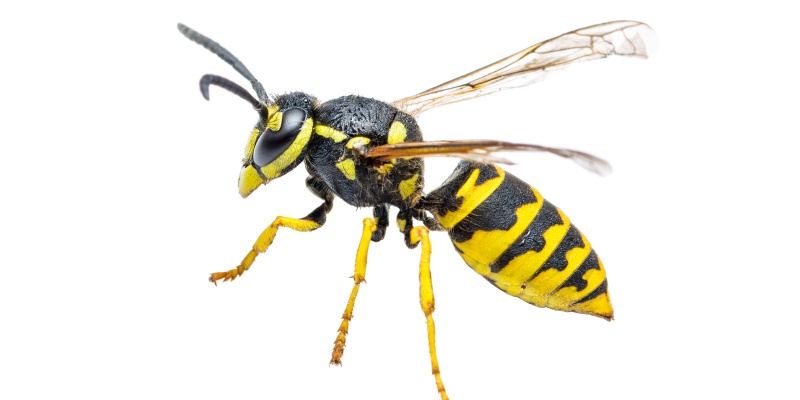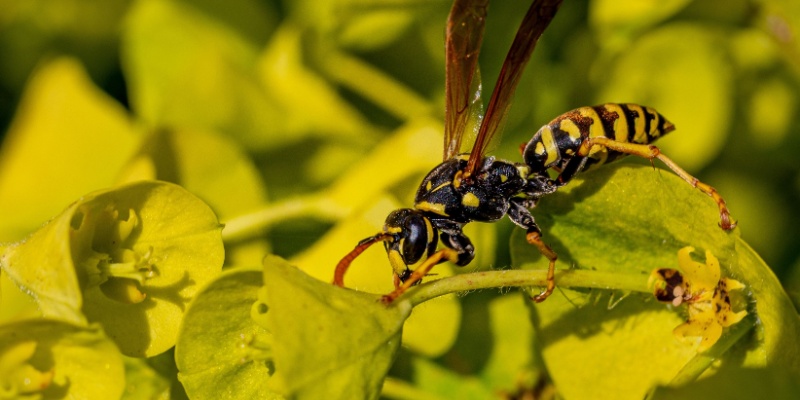Indianapolis is a beautiful city known for its lush green spaces, vibrant neighborhoods, and active outdoor lifestyle. However, the presence of wasps and yellow jackets can quickly turn a pleasant outdoor experience into a stressful and potentially dangerous situation. These stinging insects are not just a nuisance but can pose significant health risks, particularly to those who are allergic to their venom. Understanding the behavior, risks, and control measures for wasps and yellow jackets is crucial for maintaining a safe and enjoyable environment. Here’s why you should rely on the wasp and yellow jacket control experts at Trio Pest Control in Indianapolis:
Understanding Wasps and Yellow Jackets
Wasps and yellow jackets are both part of the Vespidae family, but they have distinct behaviors and nesting habits that impact how they should be managed.
1. Wasps:
- Appearance: Wasps are slender with smooth bodies, often marked with black and yellow patterns.
- Behavior: Wasps can be aggressive, especially when protecting their nests. They are beneficial in controlling other pests, as they prey on insects like caterpillars and flies.
- Nesting Sites: Wasps build nests from paper-like material, often found in sheltered areas such as eaves, attics, and tree branches.
2. Yellow Jackets:
- Appearance: Yellow jackets are smaller and more compact than wasps, with bright yellow and black striped bodies.
- Behavior: Yellow jackets are highly aggressive and can sting multiple times. They are scavengers frequently found around garbage and sugary substances.
- Nesting Sites: Yellow jackets typically nest in the ground, wall voids, or dense bushes. Their nests can house thousands of individuals.
Risks Posed by Wasps and Yellow Jackets
The presence of wasps and yellow jackets around your home can pose several risks:
- Painful Stings: Both wasps and yellow jackets can deliver painful stings. Unlike bees, they can sting multiple times, injecting venom with each sting.
- Allergic Reactions: For individuals allergic to insect venom, stings can trigger severe allergic reactions, including anaphylaxis, which requires immediate medical attention.
- Aggressive Behavior: These insects are particularly aggressive when their nests are disturbed, increasing the likelihood of multiple stings.
- Property Damage: Yellow jackets nesting in wall voids or the ground can cause structural damage over time.
Preventive Measures
Taking proactive steps can help minimize the risk of wasp and yellow jacket infestations:
- Seal Entry Points: Inspect your home for gaps, cracks, and holes where insects could enter. Use caulk or weather stripping to seal these openings.
- Maintain Your Yard: Trim trees and shrubs regularly to reduce potential nesting sites. Keep your lawn mowed and free of debris.
- Proper Waste Management: Keep garbage cans tightly sealed and clean up food and drink spills promptly, especially sugary substances that attract yellow jackets.
- Remove Standing Water: Eliminate standing water sources, such as birdbaths and pet water bowls, which attract thirsty insects.
- Inspect Regularly: Regularly check for nests around your home and yard, especially in high-risk areas like eaves, attics, and ground burrows.
Why Choose Trio Pest Control for Wasp and Yellow Jacket Management?
While DIY methods might seem appealing, the risks often outweigh the benefits when dealing with aggressive stinging insects. Here’s why you should rely on the experts at Trio Pest Control:
- Expertise and Experience: Our team has years of experience handling wasp and yellow jacket infestations. We can accurately identify the species and implement the most effective treatment methods.
- Safety First: Safety is our top priority. Our professionals use protective gear and specialized equipment to safely remove nests without putting you or our technicians at risk.
- Customized Solutions: We provide customized treatment plans based on the specific type of stinging insect and the location of the nest. This ensures effective and long-lasting results.
- Eco-Friendly Practices: Whenever possible, we use eco-friendly and humane removal techniques. We understand the importance of wasps in the ecosystem and strive to balance control with environmental responsibility.
- Comprehensive Service: Our service includes thorough inspections, safe nest removal, and preventive measures to minimize the risk of future infestations. We offer advice on how to make your property less attractive to these pests.
- Customer Satisfaction: We are committed to providing top-notch service and ensuring customer satisfaction. Our positive reviews and repeat customers speak to our dedication and professionalism.
- Emergency Services: Stinging insect infestations can escalate quickly, posing immediate threats. Trio Pest Control offers emergency services to address urgent problems promptly and effectively.
The Trio Pest Control Process
When you choose Trio Pest Control, you can expect a thorough and professional approach to managing wasp and yellow jacket infestations
- Initial Inspection: Our team conducts a detailed inspection of your property to identify the type of stinging insect and locate their nests.
- Treatment Plan: Based on our findings, we develop a customized treatment plan that may include using insecticidal sprays, dust, or traps, depending on the species and nest location.
- Safe Removal: We safely remove or treat the nests, usually during the evening or early morning when insects are less active, to minimize risks.
- Preventive Advice: After removal, we provide recommendations to prevent future infestations, such as sealing entry points and removing attractants.
- Follow-Up: We offer follow-up visits to ensure the problem is fully resolved and to provide additional treatments if necessary.
Trio Pest Control stands out as the premier choice for Indianapolis wasp and yellow jacket control due to our expertise, commitment to safety, and effective pest management solutions. With a deep understanding of local pest behavior and a dedication to environmentally responsible practices, Trio Pest Control ensures that homes and businesses remain safe from the dangers and disruptions caused by these stinging insects. Our professional team employs state-of-the-art techniques and personalized service, making them the trusted partner for all pest control needs in the Indianapolis area. Choose Trio Pest Control for peace of mind and a wasp-free environment.

